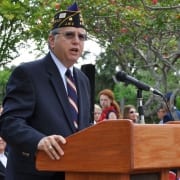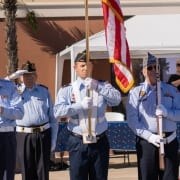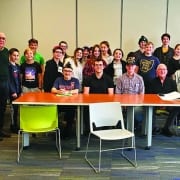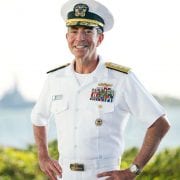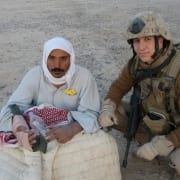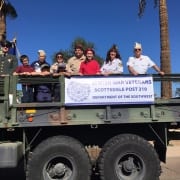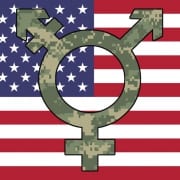Alan Paley spoke at synagogue, Temple Beth Torah Sha’aray Tzedek in Tamarac, Florida for Veteran’s Day 2018.

Temple Beth Torah Sha’aray Tzedek
Alan Paley is an active member of the synagogue and veteran. Below are his remarks to the audience.
Good Shabbos,
Tomorrow, the nation will pause for a few minutes to both honor, and pay tribute to, the many men and women who served in the military, and then returned home.
Most cities and towns hold symbolic celebrations for their veterans at the 11th hour of the 11th day, of the 11th month. For this was the time in 1918 that the armistice was signed with Germany, ending World War 1, permitting tired and homesick soldiers to return home.
But, when we speak about Veterans, we often group them together in one big giant pot.
They are all the same. Each one wore the uniform of the United States Military and basically did what they were told.
No more, no less.
But, Veterans are individuals as well. Each had a unique job that they performed. Each served in one of the five branches of the armed services. And, each served at a different time.
Starting with the American Revolution, and making our way through the Civil War, two deadly world wars, The Korean and Vietnam Wars.
And most recently, the Iraq War and the War in Afghanistan, fought as part of the U.S. War on Terrorism.
Yet, every veteran has a story all their own.
So, this morning, as we gather here in the comfortable sanctuary of our synagogue, I want to tell you about 3 individual Veterans – each unique in their military service and history. Each, a Veteran of the war in Vietnam.
Our first Veteran enlisted in the United States Navy in 1966, at a time when the draft was at its highest level. Young men and women who enlisted during this time frame were often looked upon a being somewhat “strange” Why are you enlisting? There is a war going on!!
You must be nuts to willingly join the military, were the cries often heard from family and friends. Yet, this individual did just that. He enlisted.
Following basic training at Great Lakes Illinois, this Veteran was then selected to attend Basic Electronic and Electricity Training. Upon successful completion of those studies, he was sent to Bainbridge, Maryland, to attend additional training to become a Radioman. As a certified Radioman, he was then assigned to the USS Joseph P Kennedy in 1967. His duties as a Radioman were the processing and execution of all phases of incoming and outgoing electronically generated shipboard communication.
He also helped to train lower ranking personnel in the same field. He remained on that ship until 1970. Upon discharge from active duty, he joined the Naval Reserve, where he actively served for another 6 years. While in the reserves, he took advantage of the GI Bill and enrolled in the City University of New York, he graduated at the top of his class. He then accepted a job as a Secondary Science Teacher. He remained in that position for the next 29 years, and retired in 2005 as Teacher, and Chairman of the Science Department. He is usually here every Shabbat, but is currently resting at home following a short hospital stay.
He is an involved member of our synagogue, and an active member of our Men’s Club.This Veteran is Aubrey Harley.
Our next Veteran enlisted in the United States Naval Reserve in 1968, and having already graduated from college and medical school, entered with the rank of Lieutenant. He was assigned as the Battalion Surgeon at Port Hueneme in California. However, a month later, his unit was deployed to South Vietnam, were he also served as the Battalion Surgeon.
While in Vietnam, his job was to stabilize the wounded, and prepare them to be med-evaced to area field hospitals. He saw firsthand the effects of war, as he cared for and provided medical attention to those wounded servicemen who were brought back to his Battalion for treatment. Young men, whose life at times hung by a very thin thread. Often, he stood between life and death for these wounded soldiers.
He is most proud of the fact that he initiated a program of training 3 local residents in basic health care, so they could serve as village care providers, where there was no previous health care available.
He returned to the United States in 1969 and served as the Medical Officer at the San Diego Naval Hospital. He separated from active duty in 1970 but continued to serve in the Naval Reserve until January of 1975. During this time, he was promoted to the rank of Lieutenant Commander.
He continued to practice medicine all through his civilian career and just recently retired. This Veteran, who is in the synagogue this morning, also serves as the President of our Men’s Club.
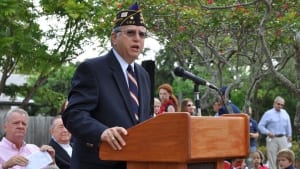
Alan Paley
This Veteran is Dr. Alan Miller.
Our third Veteran has a somewhat different story to tell.
Joining Army ROTC when he was in college, he knew that upon graduation he would have to enter the military. As a college graduate, he would enter active duty as an officer, rather than an enlisted man, so his chances of seeing action in Southeast Asia were slightly reduced. Or so he thought….. Following training in Virginia, he received orders to go to Germany.
Along with his wife, he set off to Manheim for his first overseas assignment, as a Brigade Personnel Officer.
Concurrent to his assignment in Germany, his younger brother, who had enlisted in the Air Force, was also stationed in Germany. His brother however, was not an officer, but was an airman specializing in the weapons system of the latest United States Air Force fighter jet, the Phantom F-4.
The largest, fastest fighter jet in the Air Force inventory, and the leading aircraft in the war in Vietnam.
Knowing this, and realizing that the chances of his brother getting orders for Southeast Asia far outweighed his, he decided to speak with his commanding officer and subsequently, requested a transfer to Vietnam.
After only 9 months of serving in Germany, he received orders to report to Long Binh Vietnam, for a 12-month tour of duty.
He served as a Staff Supply Officer, flying from location to location via helicopter, and insured that the men and women stationed at those posts, outposts and bases were provided with all the special services supplies they could get.
Recreational items, so the troops could enjoy whatever free time they had, before going back into battle.
His helicopter was shot at, his barracks was mortared, and several army buddies were killed during one of those mortar attacks.
He returned home a year later, to his wife and new baby daughter. Enrolling in Law School, he later practiced law, and now serves as a Superior Court Judge in New Jersey.
This Veteran, although not a member of our synagogue is my brother, and his decision to volunteer for service in a combat zone, enabled me to serve my remaining years of military service in Germany, without the threat of receiving orders for Vietnam.
I never knew what he had done until 2016, some 49 years later.
One thing each of these Veterans have in common is the deeply embedded feeling of patriotism. Although members of the military come from different walks of life, we all learned to get along and work with one another. We watched each other’s back and knew that our comrades in arms would be watching our back, too. This is the way you survive.
In this week’s Torah portion, we read the shocking story of Jacob stealing Esau’s blessing, an action that created a rivalry so bitter, it is said to still be manifesting itself today. The Torah is full of stories of brother turning against brother. Cain kills Abel, Moses is compelled by God to turn against his brother – Pharaoh, Joseph’s brothers almost kill him over their jealousy of the treatment their father Jacob gives to Joseph – culminating with Jacob giving Joseph a coat of many colors.
The collection of Jewish texts does contain a few positive stories of one brother helping another. Most famously, although the source of the story has never been proven, is the tale of King Solomon’s quest to find a suitable location to build the First Temple.
One of God’s angels takes Solomon in one of his dreams to a field owned by two brothers.
One of the brothers is a bachelor; the other is married and has children. At the end of the harvest season, each brother is concerned for the other, and under the cover of night each adds grain to the other’s pile. The married brother was concerned because he reasoned that the bachelor had no children to support him in his old age. The bachelor was concerned because he reasoned that with so many children his brother needed more grain. The brothers met in the middle of the field and embraced.
This field, a manifestation of brotherly love, King Solomon reasoned was the best site for the Temple.
Brotherly love, commitment, and honor. These are the virtues of a Veteran.
Each of the Veterans mentioned today served their country with honor, and then returned to civilian life. Each one built a successful career.
They rarely speak about their military service on their own and are often shy about discussing it, when asked by outsiders. But, all of them have earned the title of Veteran.
We are here today, able to live in this great country and enjoy the religious freedom that we have, because these men answered their call to duty, and served in the military.
And yes, a great many women answered that call too.
So, if you are a veteran, please stand up and be recognized.
Thank you all for your service.
May God bless those men and women both here today and all over the country that carry the title of Veteran. And, may God bless the United States of America.
Shabbat Shalom
Volume 72. Number 4. Winter 2018
